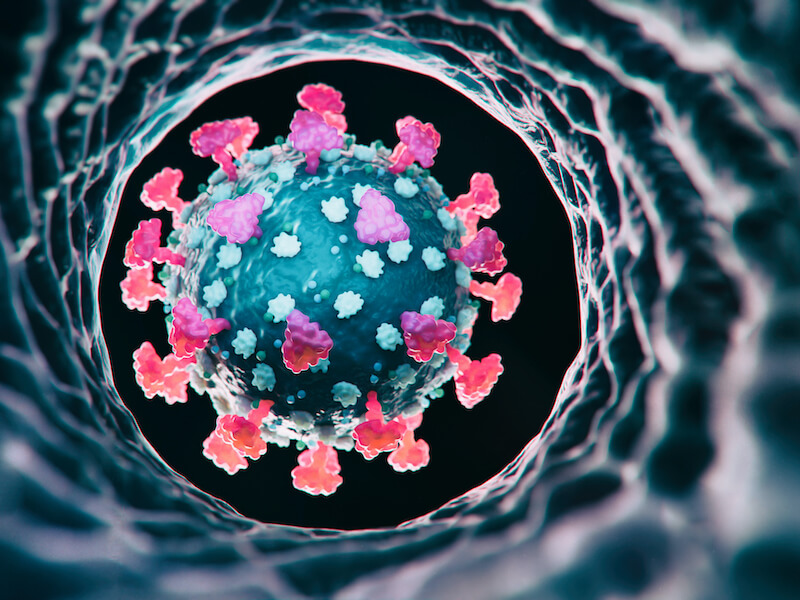
You might develop hearing loss as you get older, particularly if you frequently expose yourself to loud noise. Similarly, if you work on a busy factory floor and don’t use ear protection, hearing loss may be in your future. These hearing loss causes are fairly common. But there’s a new kid on the block, and you can probably guess who it is: Covid-19.
People throughout the world have been ravaged by all of the many symptoms and side-effects of Covid-19, and that might include issues with hearing.
Maybe? Probably? Alright, we’re still in the early stages of really understanding Covid-19. And scientists are discovering something new about it all the time. Some research does suggest that Covid-19 is linked to hearing loss, but that research is also rather preliminary and is still waiting for more information to back it up. So let’s have a look at where things stand at the moment.
So can hearing loss be caused by Covid-19?
So here’s the first thing to keep in mind: The Covid-19 vaccine has never been confirmed to cause hearing loss. All of the presently approved vaccines have this in common. That’s just not how these vaccines work, they don’t impact your ears at all. It would be like blaming your diabetes on the salad you had for dinner.
This is true of both the established vaccines and the new mRNA vaccines. For the majority of individuals, the risks are vastly exceeded by the advantages. If you have questions about vaccines, be certain to speak with your doctor, and get information from a reputable source.
Okay… with that off the table, let’s talk about hearing loss.
So, how can Covid cause hearing loss?
So how is hearing loss caused by this? Specifically, how does this cause sensorineural hearing loss, the type of hearing loss that is the result of damage to your auditory system and is usually irreversible?
Scientists have a couple of hypotheses. These theories, we should point out, aren’t always mutually exclusive. They can both be true!
Theory #1: inflammation
The first compelling theory among researchers is that Covid-19 causes considerable inflammation in the upper respiratory tract, and that this inflammation can eventually impact your ears. After all, your nose, mouth, and ears are all connected. This may cause hearing loss in a couple of ways:
- Fluid buildup: Fluid has a more difficult time draining because inflammation has made the drainage channels more narrow. It becomes harder and harder to hear as this fluid continues to accumulate. In these cases, your hearing will typically go back to normal after your symptoms clear up (if this happens, you’re not experiencing sensorineural hearing loss).
- Cell damage: It’s essential to remember that viruses reproduce by hijacking your body’s own cells. The result is damage. And because Covid affects your vascular system, this can in some cases cause damage to the vascular connections between your ears and your brain. This would be considered sensorineural hearing loss, and would probably be essentially permanent.
When hearing loss is a result of a buildup due to inflammation, steroids can sometimes help. There’s still a continuing effort by scientists to find a way to prevent sensorineural hearing loss. It’s unclear, based on this research, just how much protection vaccines give you against this type of damage, but it’s safe to say it’s better than no protection.
Theory #2: Long Covid
The second hypothesis is a bit murkier in terms of the cause and effect, but more corroborated with regards to patients’ experience. At this point, you’ve probably heard about something called Long Covid.
Long Covid is a condition in which individuals experience symptoms from Covid long after the actual virus has left their body. Sometimes, people will experience a mild bout of Covid followed by a debilitating Long Covid experience that drags on for months (or longer). There’s no question, Long Covid is real, but scientists are still unsure why.
Data about long-term hearing problems was systematically reviewed by researchers and a report was published in February 2021. The review found that:
- 14.8% reported experiencing tinnitus
- 7.6% of people reported hearing impairment after becoming ill with Covid.
- 7.2% of people reported vertigo
There’s definitely a connection between Long Covid and hearing problems, but it’s not known if there’s a direct cause and effect association. A host of symptoms, including hearing problems, come from Long Covid.
Evidence or anecdote?
When someone talks about how they got Covid and had hearing issues ever since, that’s an anecdote. It’s one individual narrative. And while it’s a fact of life for them, it isn’t actually enough for researchers to go on when developing treatment plans. That’s why research is so crucial.
As researchers uncover more evidence that these hearing difficulties are fairly widespread, they’re able to create a clearer understanding of the risks involving Covid-19.
Of course, there’s still more to learn. The connection between Covid and hearing loss isn’t either proven or unproven at this point and research is continuing. It’s essential to seek help as soon as you can regardless of how your hearing loss developed. So if you suspect your hearing isn’t what it used to be, call us to schedule an appointment.
References
https://www.frontiersin.org/articles/10.3389/fneur.2022.883749/full
https://www.tandfonline.com/doi/abs/10.1080/14992027.2021.1896793?journalCode=iija20&